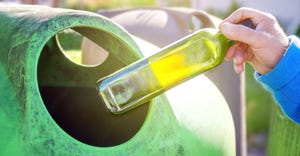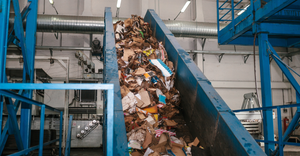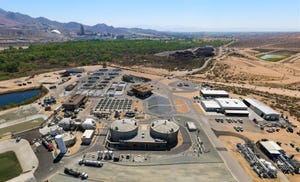The House That Barbara Built
March 1, 1997
Shirley H. Plews
Wouldn't you love to own a company whose workers were so dedicated to their jobs, that when they took ill, rather than leave the company without manpower, they send a relative to work in their place instead? How about a 99 percent show-up rate by truck drivers when the temperatures are -10 degrees?
Incredulous as this may sound, this is commonplace at the Fred B. Barbara Family of Companies, headquartered in the heart of Chicago.
"Without my employees, I couldn't have done what I was able to do," said Fred B. Barbara, president and chief operating officer. "Employ-ees take pride in their work and this pride is directly reflected in service to our customers."
Having such dedicated employees has allowed Barbara to build a successful, full-service disposal and recycling operation in an area of the country wrought with heavy hitters such as WMX Technologies Inc.; Browning-Ferris Industries Inc (BFI); USA Waste Services Inc.; and Allied Waste Industries Inc.
A native Chicagoan, Barbara was born into a family with a track record in the trucking business. Barbara's grandfather left Italy in the early 1900s and operated five trucks, alternating transportation of ice in the summer and coal in the winter. His father owns A. Barbara Trucking, a dump truck operation also based in Chicago.
Barbara joined his father's company in high school as a mechanic's assistant. After high school graduation, he became a driver, and in 1976, struck out on his own, buying his first truck and made a living by hauling asphalt and gravel for construction customers.
Since then, the Barbara Family of Companies has grown to include: Fred B. Barbara Trucking, Shred-All Recycling Systems and Environtech Landfill, which collectively generate annual revenues of approximately $36 million and employ more than 150 people. Barbara's 30,000-square-foot, multi-purpose transfer station, built on five acres, is the hub of Shred-All's operations.
Built in 1991, the facility services both Barbara's trucks and other Chicago solid waste disposal companies. It accepts 2,000 tons per day (tpd) of municipal garbage, recyclable materials, old tires, wood and construction and demolition (C&D) debris.
The city of Chicago, its largest customer, delivers 50 percent of the daily tonnage. Tip fees are in the high $30s per ton.
Shred-All Recycling Systems Late last year, Barbara unveiled a new addition to Shred-All Recycling Systems: a modern, multi-million dollar materials recovery facility (MRF) that now stands in a building used to pack meat in the 1930s.
Why does Barbara invest so much in recycling, when other haulers are divesting? "Simple," he said. "I wanted to be more competitive in the trash business and felt this could be accomplished by offering recycling services." This tactic also allows Barbara to reinvest in his companies, as each one provides complementary support for the others.
The 26,000-square-foot recycling center is permitted to process 1,000 tpd. Materials are moved along a 175-foot conveyor system which connects the adjacent transfer station to the recycling center. During the one 10-hour shift, about 30 employees sort materials, such as cardboard, newspaper, metal, plastic, glass and wood.
The enclosed sorting area has amenities designed to maintain a safe and positive working environment for the employees: The room is air-conditioned and continuous music plays in the background. A scrubber-filter system ensures clean air quality for the sorters, who are assigned a permanent work station.
From the sorting stations, employees drop materials down chutes leading to separate cages on the first floor. The materials either are baled or sold in bulk to dealers. Shred-All has established relationships with several brokers to sell the material. As for his materials marketing philosophy, Barbara said he prefers to "shop around" to avail himself of multiple resources.
The building also features an enclosed viewing area for visitors interesting in learning about the recycling process. Barbara evaluated the role recycling would play in his business mix before constructing the center. "We built the recycling center for the year 2000's needs, not 1996's needs," he said. The MRF is currently using 10 percent of its capacity - a figure that Barbara expects to increase in the future.
When asked about this investment, which is so closely situated to four MRFs operated under contract with the city, Barbara commented, "as the city grows, there will be room for everyone."
Barbara offers his customers something unique: a partnership. If materials generate enough revenue, he presents the customer with a rebate at year's end. This eliminates most of the difficulty of tracking market prices monthly and cutting checks. Plus, it allows customers to budget for refuse services based on its actual cost.
However, he makes no revenue promises. Do customers respond, knowing that they have to pay for the service? They were reluctant at first, Barbara admitted. However, by educating customers about the potential decrease in waste removal charges, Barbara was able to develop a sizable customer base.
"Educate customers about the economics of recycling," he advised. "It may cost to recycle in some in-stances. However, show customers the avoided disposal fees." Forty percent of Barbara's recycling customers received a rebate last year. Tip fees at the recycling facility are in the high $40s per ton.
In 1992, the city enacted a recycling ordinance, mandating a five-year goal to recycle 25 percent of all municipal solid waste generated. Businesses and apartment buildings also are required to develop recycling programs. "Everyone is stumbling along to figure out what works. Recycling has no established set of rules," he said.
As for the city's blue bag residential recycling program, Barbara feels that the "city has the right idea with the recycling centers. It was a bold and progressive step to make such a financial commitment to and investment in recycling."
Recycling C&D Also on the five-acre property is a separate 15,000-square-foot building for processing C&D debris. Front-end loaders and a trommel system separate incoming construction debris, including cement, wood and tree stumps.
C&D customers view Barbara's service as a valuable tool in controlling their waste, representing a more cost-effective landfill alternative.
Barbara purchased a Rexworks wood grinder that processes at 100 tons per hour (tph). This ground-up wood is used as landfill roadfill, on forest preserve trails and in chipboard. Concrete is delivered to a private concrete crusher that is unaffiliated with Barbara's company.
A section of the transfer station is used to shredscrap passenger and truck tires. Eight years ago, Barbara purchased a Mac-Saturn mobile shredder which can process about 75 tph.
Each month, the facility sends 1,500 tons from this operation to Waste Recov-ery's tire-derived fuel facility in Marseilles, Ill., which has contracted with Shred-All since 1991.
The shredder also processes wood pallets, 55-gallon drums, aluminum scrap, paper and wire. Currently, Barbara is negotiating the purchase of a larger shredder, to use permanently on-site.
Environtech Landfill Located 60 miles outside of Chicago in Morris, Ill., Environtech Landfill was purchased by Barbara in 1986 to support his trucking and recycling operations. Daily, 1,000 tons of municipal solid waste, non-recyclable garbage and separated bulk waste are landfilled there. The tip fees range from the high teens to the low $20s per ton. Based on 1996's average volume, Barbara expects the landfill to be open for 17 more years. It currently operates on 105 permitted acres.
An in-ground water monitoring and leachate collection system automatically pumps excess wastewater to the city of Morris for filtration and cleaning. Due to anticipated landfill closures in the next 18 months, En-virontech will remain as one of few to operate within a 60-mile radius of Chicago, said Barbara.
As a daily cover, he uses six inches of dirt or rejected paper pulp from a separate operation and is currently installing a methane gas system manufactured by DuPage Bio-Energy Inc., Barlett, Ill.
Barbara has put technology to work for him. A computerized weighing system at the landfill, manufactured by RMS Refuse Management System and developed by Target Market Systems, Rochester, N.Y., provides customers with instant data about their loads, such as volume or weight, tip fee, truck number and the date.
Such technology enables the landfill to be run by a lean staff of 10 employees. "Automation is the only way to go," said Barbara, who noted that it allows for immediate feedback and is great for billing.
This system also provides data - material, weight, customer, truck number and driver - on all trucks entering the Shred-All transfer station. As a bonus, the city of Chicago receives direct data transmission to record all loads.
Barbara Trucking If you live or work around Chicago, you will recognize the familiar orange color of Barbara's fleet. Choosing flaming orange as his signature truck color was part of his marketing strategy to boost visibility.
Rather than require employees to dress uniform style, Barbara provides hats, jackets and t-shirts with the "Barbara orange" and signature logo.
The trucking operation employs more than 100 people to manage the transportation of more than 5,000 tpd of solid waste.
Barbara owns and operates all of the equipment, including 115 late-model, radio-dispatched Mack tractors, 135 transfer trailers, dumptrailers and seven packers, seven 70-ton cranes with 85-foot booms and eight rubber tire highlifts, available for leasing to customers.
Using live-floor transfer trailers, Barbara serves 600 collection customers and provides transportation services for six other transfer stations.
The fleet is maintained on-site at the nine-acre fleet yard. Barbara em-ployees wash, repair, paint and detail the trucks regularly. Using two 1,400 psi pressure washers, six employees handwash each vehicle.
Since starting in 1976, Barbara has provided a wide range of trucking services for customers, in-cluding commercial and residential sectors, as well as local government.
For example, Barbara Trucking has hauled excavated materials for major construction contractors and has transported residential waste from city of Chicago transfer stations to landfills in Illinois, Indiana and Michigan.
The company maintains an exclusive hauling contract with BFI, Houston, and FSC Paper, Alsip, Ill., a subsidiary of Wisconsin Tissue. Any rejected paper pulp from FSC's newspaper deinking process that cannot be recovered is used as alternate daily cover at either a BFI landfill or the En-virontech Landfill. A-bout 1,000 tpd are transported by Barbara Trucking.
Barbara encourages others to form joint ventures. Especially for smaller companies, strategic partnering with bigger, national companies can be beneficial.
"You can complement your own business. Never rule it out," he recommended.
Several times, Bar-bara was called by larger companies to support a job. He said people work with him because they know he is reliable and reported he likes the challenge of "being called upon to do the impossible."
Size has its advantages. "I don't need to hold a big staff meeting to make a decision on how best to help my customers," he said. "If someone else can't do the job, we will find a way."
The employees act almost like family. "If they have the "I-can-do-it" attitude and they look out for one another, then the company is more competitive," he said. And no one is exempt from work: Rather than rest on his laurels, Barbara works 14-hour days running a hands-on operation.
Perhaps this "all-for-one-and-one-for-all' philosophy derives from employing family in the business. He employs six family members: his brother, Bruno is the superintendent of overall operations; son, Anthony is the general manager of Shred-All; daughter, JoMarie, has provided accounting support; JoMarie's husband, Russell, is Shred-All's lead dispatcher; and his youngest daughter, Jamie, is working part-time as a secretary while a full-time student at DePaul University.
On The Horizon What's next for Barbara? "The sky is the limit," he said, stressing his desire to expand the Environtech Landfill. There is a permit application pending with the Illinois Environ-mental Protection Agency. If granted, it would add 10.6 million gate yards of capacity. Barbara also plans to develop additional transfer stations and recycling centers.
Barbara said his dream was to own a company which made a profound statement. Here in the heart of Chicago, one of the industry's most competitive markets, a dedicated entrepreneur proves daily that the hallmarks of success are basic: treat your people and your customers with respect. It reaps tremendous dividends.
Trucks: 115 Mack tractors; 60 110-yard transfer trailers; 75 30-yard dump trailers; 20 service vehicles; 20 special equipment vehicles; 8 CAT rubber tire hylifts (5-12 yard bucket capacities); 7 50- to 100-ton cranes; 9 CAT tract bulldozers; 7 Mack model MR packer rear loaders (Leach 2RII bodies); 9 Mack model DM rolloffs with Galbreath hoists
Containers: * Rolloff boxes: 75 15-yard, 125 20-yard, 100 30-yard, 100 40-yard
* Compactor boxes: 50 30-yard, 50 40-yard, 25 40 yard
* Other: 2,500 of assorted sized containers
Customers: 1,000 commercial and industrial customers
Employees: 150
Service area: Greater Chicago area, including neighboring suburbs
Services: Recycling; construction and demolition debris removal and/or recycling; business and industry (commercial) waste collection; tire shredding, wood grinding and asbestos hauling
Most interesting: Employees found a live puppy in a city of Chicago residential packer garbage load. The puppy jumped out of the load alive and well, and became the mascot of the transfer station.
You May Also Like


